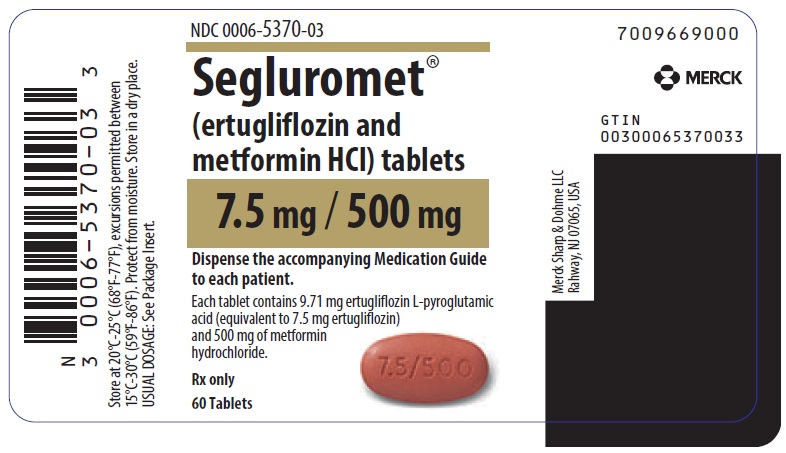Ertugliflozin
Generic name: ertugliflozin
Brand name: Steglatro
Dosage form: oral tablet (15 mg; 5 mg)
Drug class: SGLT-2 inhibitors
Medically reviewed by A Ras MD.
What is ertugliflozin?
Ertugliflozin is a prescriptin medicine that is used to lower blood sugar in patients with high blood sugar (diabetes).
Description
SEGLUROMET (ertugliflozin and metformin hydrochloride) tablet for oral use contains ertugliflozin L-pyroglutamic acid, a SGLT2 inhibitor, and metformin HCl, a member of the biguanide class.
Ertugliflozin
The chemical name of ertugliflozin L-pyroglutamic acid is (1S,2S,3S,4R,5S)-5-(4-chloro-3-(4-ethoxybenzyl)phenyl)-1-(hydroxymethyl)-6,8-dioxabicyclo[3.2.1]octane-2,3,4-triol, compound with (2S)-5-oxopyrrolidine-2-carboxylic acid. The molecular formula is C27H32ClNO10 and the molecular weight is 566.00.
The chemical structure is:

Ertugliflozin L-pyroglutamic acid is a white to off-white powder that is soluble in ethyl alcohol and acetone, slightly soluble in ethyl acetate and acetonitrile and very slightly soluble in water.
Metformin HCl
Metformin hydrochloride (N,N-dimethylimidodicarbonimidic diamide hydrochloride) is not chemically or pharmacologically related to any other classes of oral antihyperglycemic agents. The structural formula is as shown:

Metformin HCl is a white to off-white crystalline compound with a molecular formula of C4H11N5∙HCl and a molecular weight of 165.63. Metformin hydrochloride is freely soluble in water and is practically insoluble in acetone, ether and chloroform. The pKa of metformin is 12.4. The pH of a 1% aqueous solution of metformin hydrochloride is 6.68.
SEGLUROMET is available as film-coated tablets containing:
- 3.24 mg ertugliflozin L-pyroglutamic acid equivalent to 2.5 mg of ertugliflozin and 500 mg metformin HCl (SEGLUROMET 2.5/500)
- 3.24 mg ertugliflozin L-pyroglutamic acid equivalent to 2.5 mg of ertugliflozin and 1,000 mg metformin HCl (SEGLUROMET 2.5/1000)
- 9.71 mg ertugliflozin L-pyroglutamic acid equivalent to 7.5 mg of ertugliflozin and 500 mg metformin HCl (SEGLUROMET 7.5/500)
- 9.71 mg ertugliflozin L-pyroglutamic acid equivalent to 7.5 mg of ertugliflozin and 1,000 mg metformin HCl (SEGLUROMET 7.5/1000)
Inactive ingredients are povidone, microcrystalline cellulose, crospovidone, sodium lauryl sulfate, and magnesium stearate.
The film coating contains: hypromellose, hydroxypropyl cellulose, titanium dioxide, iron oxide red, and carnauba wax.
Mechanism of Action
SEGLUROMET
SEGLUROMET combines two antihyperglycemic agents with complementary mechanisms of action to improve glycemic control in patients with type 2 diabetes mellitus: ertugliflozin, a SGLT2 inhibitor, and metformin hydrochloride, a member of the biguanide class.
Ertugliflozin
SGLT2 is the predominant transporter responsible for reabsorption of glucose from the glomerular filtrate back into the circulation. Ertugliflozin is an inhibitor of SGLT2. By inhibiting SGLT2, ertugliflozin reduces renal reabsorption of filtered glucose and lowers the renal threshold for glucose, and thereby increases urinary glucose excretion.
Metformin HCl
Metformin is an antihyperglycemic agent which improves glucose tolerance in patients with type 2 diabetes mellitus, lowering both basal and postprandial plasma glucose. Its pharmacologic mechanisms of action are different from other classes of oral antihyperglycemic agents. Metformin decreases hepatic glucose production, decreases intestinal absorption of glucose, and improves insulin sensitivity by increasing peripheral glucose uptake and utilization. Metformin does not produce hypoglycemia in either patients with type 2 diabetes mellitus or normal subjects (except in special circumstances) and does not cause hyperinsulinemia. With metformin therapy, insulin secretion remains unchanged while fasting insulin levels and day-long plasma insulin response may actually decrease.
Before taking ertugliflozin, tell your doctor:
- If you are allergic to ertugliflozin; any part of this medicine; or any other drugs, foods, or substances. Tell your doctor about the allergy and what signs you had.
- If you have ever had any of these health problems: Acidic blood problem, kidney disease, liver disease, or type 1 diabetes.
- If you are dehydrated, talk with your doctor.
- If you are pregnant or may be pregnant. Do not take ertugliflozin if you are in the second or third trimester of pregnancy.
- If you are breast-feeding. Do not breast-feed while you take ertugliflozin.
This is not a list of all drugs or health problems that interact with ertugliflozin.
Tell your doctor and pharmacist about all of your drugs (prescription or OTC, natural products, vitamins) and health problems. You must check to make sure that it is safe for you to take ertugliflozin with all of your drugs and health problems. Do not start, stop, or change the dose of any drug without checking with your doctor.
What are some things I need to know or do while I take ertugliflozin?
- Tell all of your health care providers that you take ertugliflozin. This includes your doctors, nurses, pharmacists, and dentists.
- Do not drive if your blood sugar has been low. There is a greater chance of you having a crash.
- To lower the chance of feeling dizzy or passing out, rise slowly if you have been sitting or lying down. Be careful going up and down stairs.
- Be careful in hot weather or while being active. Drink lots of fluids to stop fluid loss.
- If you cannot drink liquids by mouth or if you have upset stomach, throwing up, or diarrhea that does not go away; you need to avoid getting dehydrated. Contact your doctor to find out what to do. Dehydration may lead to new or worse kidney problems.
- If you are on a low-salt or salt-free diet, talk with your doctor.
- If you are not able to eat or drink like normal, talk with your doctor. This includes if you are sick, fasting, or you are having certain procedures or surgery.
- High cholesterol has happened with ertugliflozin. If you have questions, talk with the doctor.
- Have blood work checked as you have been told by the doctor. Talk with the doctor.
- This medicine may affect certain lab tests. Tell all of your health care providers and lab workers that you take ertugliflozin.
- Check your blood sugar as you have been told by your doctor.
- Talk with your doctor about which glucose tests are best to use.
- Talk with your doctor before you drink alcohol.
- Too much acid in the blood or urine (ketoacidosis) and severe urinary tract infections (UTIs) have happened. Ketoacidosis can be deadly. Both of these may need to be treated in a hospital.
- Kidney problems have happened. Sometimes, these may need to be treated in the hospital or with dialysis.
- This medicine may raise the risk of leg and foot amputations. Tell your doctor if you have ever had an amputation, blood vessel disease, nerve disease, or a foot ulcer caused by diabetes. Call your doctor right away if you have new pain or tenderness, sores or ulcers, or infections in your legs or feet.
- A rare but very bad infection has happened with drugs like this one. This infection may be deadly. Get medical help right away if your genitals or the area between your genitals and rectum becomes tender, red, or swollen, and you have a fever or do not feel well.
- If you are 65 or older, use ertugliflozin with care. You could have more side effects.
- This medicine may cause harm to the unborn baby if you take it while you are pregnant. If you are pregnant or you get pregnant while taking ertugliflozin, call your doctor right away.
How is ertugliflozin best taken?
Use ertugliflozin as ordered by your doctor. Read all information given to you. Follow all instructions closely.
- Take in the morning.
- Take with or without food.
- Keep taking ertugliflozin as you have been told by your doctor or other health care provider, even if you feel well.
- Follow the diet and workout plan that your doctor told you about.
- It may be harder to control blood sugar during times of stress such as fever, infection, injury, or surgery. A change in physical activity, exercise, or diet may also affect blood sugar.
What do I do if I miss a dose?
- Take a missed dose as soon as you think about it.
- If it is close to the time for your next dose, skip the missed dose and go back to your normal time.
- Do not take 2 doses at the same time or extra doses.
What are the side effects of ertugliflozin that I need to call my doctor about immediately?
WARNING/CAUTION: Even though it may be rare, some people may have very bad and sometimes deadly side effects when taking a drug. Tell your doctor or get medical help right away if you have any of the following signs or symptoms that may be related to a very bad side effect:
- Signs of an allergic reaction, like rash; hives; itching; red, swollen, blistered, or peeling skin with or without fever; wheezing; tightness in the chest or throat; trouble breathing, swallowing, or talking; unusual hoarseness; or swelling of the mouth, face, lips, tongue, or throat.
- Signs of fluid and electrolyte problems like mood changes, confusion, muscle pain or weakness, a heartbeat that does not feel normal, very bad dizziness or passing out, fast heartbeat, more thirst, seizures, feeling very tired or weak, not hungry, unable to pass urine or change in the amount of urine produced, dry mouth, dry eyes, or very bad upset stomach or throwing up.
- Signs of too much acid in the blood (acidosis) like confusion; fast breathing; fast heartbeat; a heartbeat that does not feel normal; very bad stomach pain, upset stomach, or throwing up; feeling very sleepy; shortness of breath; or feeling very tired or weak.
- Signs of a urinary tract infection (UTI) like blood in the urine, burning or pain when passing urine, feeling the need to pass urine often or right away, fever, lower stomach pain, or pelvic pain.
- Signs of kidney problems like unable to pass urine, change in how much urine is passed, blood in the urine, or a big weight gain.
- For females, vaginal yeast infection. Report itching or discharge.
- For men, yeast infection of the penis. Report pain, swelling, rash, or discharge.
- Low blood sugar can happen. The chance may be raised when ertugliflozin is used with other drugs for diabetes. Signs may be dizziness, headache, feeling sleepy or weak, shaking, fast heartbeat, confusion, hunger, or sweating. Call your doctor right away if you have any of these signs. Follow what you have been told to do for low blood sugar. This may include taking glucose tablets, liquid glucose, or some fruit juices.
What are some other side effects of ertugliflozin?
All drugs may cause side effects. However, many people have no side effects or only have minor side effects. Call your doctor or get medical help if you have any side effects that bother you or do not go away.
These are not all of the side effects that may occur. If you have questions about side effects, call your doctor. Call your doctor for medical advice about side effects.
You may report side effects to the FDA at 1-800-332-1088. You may also report side effects at https://www.fda.gov/medwatch.
If overdose is suspected:
If you think there has been an overdose, call your poison control center or get medical care right away. Be ready to tell or show what was taken, how much, and when it happened.
How do I store and/or throw out ertugliflozin?
- Store in the original container at room temperature.
- Store in a dry place. Do not store in a bathroom.
- Keep all drugs in a safe place. Keep all drugs out of the reach of children and pets.
- Throw away unused or expired drugs. Do not flush down a toilet or pour down a drain unless you are told to do so. Check with your pharmacist if you have questions about the best way to throw out drugs. There may be drug take-back programs in your area.
Label
PRINCIPAL DISPLAY PANEL – 2.5 MG/1,000 MG TABLET BOTTLE LABEL
- NDC 0006-5373-03
- Segluromet®
(ertugliflozin and
metformin HCl) tablets - 2.5 mg / 1,000 mg
- Dispense the accompanying Medication Guide
to each patient. - Each tablet contains 3.24 mg ertugliflozin
L-pyroglutamic acid (equivalent
to 2.5 mg ertugliflozin) and
1,000 mg of metformin
hydrochloride. - 60 Tablets
Rx only

PRINCIPAL DISPLAY PANEL – 7.5 MG/500 MG TABLET BOTTLE LABEL
- NDC 0006-5370-03
- Segluromet®
- (ertugliflozin and
metformin HCl) tablets - 7.5 mg / 500 mg
- Dispense the accompanying Medication Guide
to each patient. - Each tablet contains 9.71 mg ertugliflozin L-pyroglutamic
acid (equivalent to 7.5 mg ertugliflozin)
and 500 mg of metformin
hydrochloride. - Rx only
- 60 Tablets

SRC: NLM .
